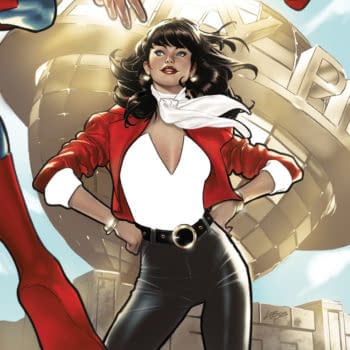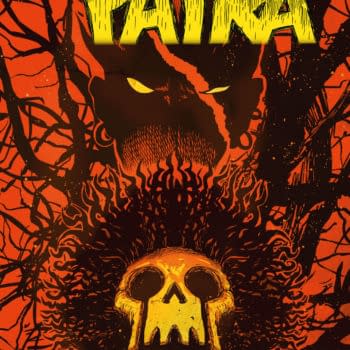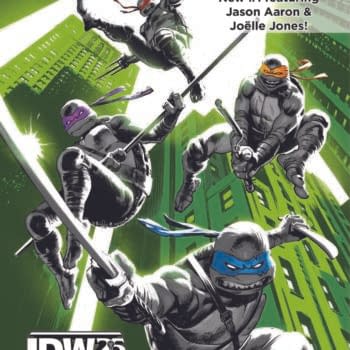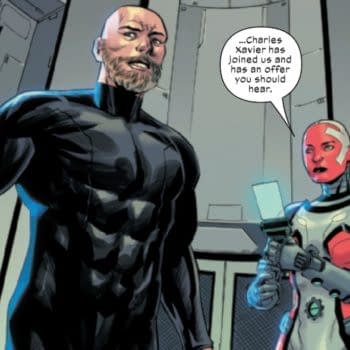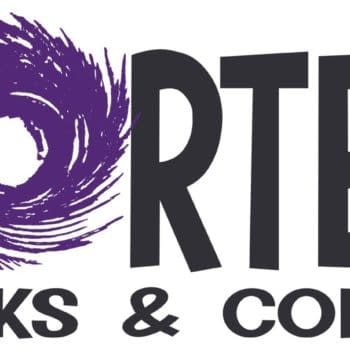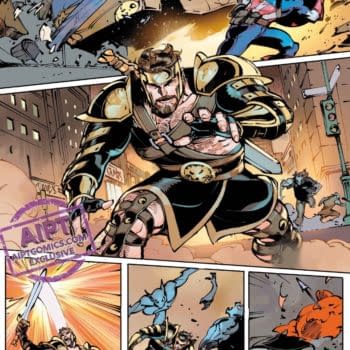Posted in: Comics, Recent Updates | Tagged: Batman, batman eternal, boom studios, Comics, entertainment, james tynion iv, LGBT comics, Red Hood And The Outlaws, scott snyder, talon, the woods, tumblr
Tales From The Four Color Closet – Talking With James Tynion IV
By Joe Glass
James Tynion IV has had a great time of it for his comics career.
Between starting his career straight on Batman, co-writing back-up features with superstar writer Scott Snyder, he then moved onto a series of New 52 titles including Talon, Red Hood and the Outlaws and now is one of the writing team of weekly Bat-venture, Batman Eternal.
But recently, Tynion IV used his tumblr to make something very personal about himself known publicly: he came out of the closet as a bisexual man.
Now, with his new BOOM! Studios release, The Woods, out 7th May, and drawn by Michael Dialynas, his first original print release, I had a chat with Tynion IV about why he decided to become public as a bi man, and more about his work, including the recently announced X-project over at Marvel.
Joe Glass: You recently came out as bi (at least publicly in your role as a comics writer) via tumblr. What prompted your decision to share this part of your life?
James Tynion IV: Somehow, after years of being very open and active about who I was in my social groups and life in general, I found myself back in the closet. I've mostly been dating women in the last couple of years, and I basically let everyone around me assume I was straight. It wasn't exactly lying, but there's a fine line when you make an abstract statement about an old flame, and you're stuck playing the pronoun game because you don't want to get into that conversation. In my all-boys Catholic high school, I helped found my school's first GSA equivalent, but flash forward almost a decade and I'm pretending that it was a crush on a girl that got me reading superhero comics again in Middle School. It was straight up no-good.
And bigger than that, honesty is everything in writing. You need to let yourself bleed on the page otherwise there's no truth to it. No power. I spent most of college writing creative non-fiction, memoirs about my life, and my fiction always took its emotional spine from the things I dealt with in my day-to-day life. The more I was worried about concealing that, the more I felt like my work was getting away from me. 2014 is a big year for me, and I knew all of my work was very personal, and that most of the characters that I would be working on spawned out of very real parts of my psyche. How would I talk about that with an audience without revealing that the awkward gay stage crew kid in The Woods is basically just me Sophomore year of High School? I didn't want to be closed off anymore, and so I took the plunge and came out again.
JG: What are your thoughts on the state of LGBT representation in mainstream comics?
JT: It's getting much, much better, although obviously there's still a very long way to go. Queer characters are much more a part of the tapestry that people are building in their independent series as well as in their big two superhero comics, particularly in their supporting casts, and that's amazing. I would love to see way more representation in leading roles. I think young LBGT readers need to see superheroes that reflect them a lot more directly, but it also isn't something that can be forced. You don't just want there to be a Northstar miniseries to get the PR buzz that you have a gay comic book, you want a story that actually speaks to the issues that people are going through today.
The story of growing up gay in America has changed so much in the last 15 years, and it's changing so much day-to-day. There's a lot less of that kind of full-on alienation where you don't know if anyone in the world is going through what you're going through, and a lot more of separating out your online life (where you can be open and free) and your daily life (where you feel like you need to be closed off). And then there's the big "T" at the end of the acronym that gets ignored FAR too often, and has the furthest to go in terms of sensitive representation… And by sensitive I don't mean the overtly PC, "we all love you," representation (which is important and has its place)… We need to show the struggle, too. That's an incredibly important part of representation. It's about showing the world what the people around them they don't understand go through every single day. I know those are the stories that spoke to me when I was coming out as a young man. There are lots of stories to tell there, across the whole spectrum of gender and sexuality, and I want to see them told.

JT: It's really simple, actually. I promised myself in High School that if I started writing books or comics, that I'd always have LGBT characters in it. It's not even something I think about, or have to force in, because half of my friends in my social group are LBGT, so when I'm left to my own devices, that's the kind of social dynamic that I'm used to and want to write in my fiction. Sure, there's an element of wanting to raise the awareness, but it's a lot more just me writing what I know… And what I know is a group of weirdos who date all sorts of people, and argue about Game Of Thrones episodes until 4AM at the local bar.
JG: You've also mentioned an upcoming project with a gay protagonist in it. Anything else you can share about the project?
JT: Not just yet, aside from the fact that it's a horror story, so people probably shouldn't look to it for happy nice things happening to gay protagonists. But it's one of my favorite things that I've ever written and I can't wait to see it come to life later this year.
JG: What's it like being openly bi working in comics? Have you had any problems, or have you found it a positive experience since coming out about it?
JT: I definitely expected some kind of lashing out, but it never really came. The worst was just a kind of "Hey, why couldn't somebody a little more established and awesome have come out?" Which is pretty great in terms of worst case scenarios. I mean, I had all sorts of worries about people having a problem with somebody who wasn't straight being one of the head writers of a weekly Batman comic book series. I thought I was going to get piles and piles of hate mail, but everyone was just super nice and supportive. Especially within the comics community. Now I just get into conversations at conventions where straight creators tell me how lucky I am to be able to pursue everyone, and I have to explain it's not an addition equation, its multiplication. Multiply all the things that are stressful about dating women by all the things that are stressful about dating men, and then live with that every single day. Then I see the horror in their eyes and know they understand. Heh.
JG: What would be your advice to LGBT comics' creators, new or old?
JT: I think the biggest thing that I thought for a long time, including when I was just a young creator, is that by coming out, I would be kept away from the big comic franchises. Like, I always just kind of assumed that they would never let an LGBT writer work on a story focused on a Robin… But at this point, I've written every single Robin except for Damian, and nobody has ever given it a second thought. If you think there's a limitation of what you'll be able to do once you open up about yourself and be who you are, you're wrong. If you want to work in the mainstream, fight your way to work in the mainstream just the same as everybody else. I'm not saying there won't be weird roadblocks that pop up from time to time, but the world is changing and just because you're part of a minority doesn't mean you can't write anything you damn well want to.
JG: Have you ever come up against any resistance to including LGBT characters in your books?
JT: Nope, Never. I've braced for it before, but I've never had trouble introducing an LGBT character when I've wanted to.
JG: What do you think mainstream comics companies need to do to improve LGBT representation in the medium?
JT: Honestly, I think a lot of it comes down to finding a wider range of voices with a wider range of backgrounds, that more accurately reflects the readership and looks to expand the readership by leaps and bounds. But it's a cyclical problem that's harder to break through than it seems. Because there aren't a spectacular number of LGBT characters, or characters who aren't straight white men in general, it's harder for people who aren't straight white men to find the comic story that speaks to them so hard that they grow up wanting nothing more than to write a comic book. And then the talent pool stays straight and white and male for another generation, which inspires another generation of straight white men.
That's the whole history of comics right now, and there are obviously exceptions, but I think publishers need to go out of their way to think less about the audience they have now, and more about the audience of 20 years from now. Nobody wants this industry to keep shrinking, and there's not enough thought going into a more aggressive expansion. The trouble is, the last few generations of fans haven't supported books with minorities in leading roles, so the companies are understandably apprehensive of pushing them forward. They do, from time to time, to test the waters, and I think they need to do it more, and do more interesting things when they do try it… But I think that's really the heart of it.
JG: Coming out of C2E2, it's been announced that you'll be working on an X-Men project in September. Any hints on what that involves?
JT: I can't really start talking about it yet, but it'll be spinning out of the events of Charles Soule's THE DEATH OF WOLVERINE, and help set the stage for what happens next in that corner of the X-Books. I could not be more excited to be involved.
JG: What attracted you to working on an X-Title?
JT: I grew up an X-Kid in the 90's. I adored the animated series. My first comics were X-Men comics. I had a huge poster of the X-Men on my wall from the time I was 5 until I graduated from HS (and I still have it in storage somewhere…). I think the X-Men appeal to anyone who has ever felt like an outsider… The idea of building a community out of people who don't fit in with the mainstream was extraordinarily powerful to me as a young man struggling to cope with who I was, and it's just as powerful to me today. I couldn't be more honored to have the chance to play with a corner of their mythos.
Joe Glass is a Bleeding Cool contributor, and creator of LGBTQ superhero team comic The Pride, and co-writer on Welsh horror-comedy series, Stiffs. You can follow him on twitter and tumblr.














